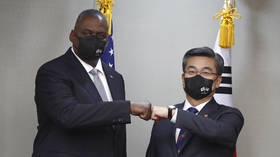The war that the US hopes will never end
Reports that there is an agreement in place to bring the Korean War to an end should not be taken seriously. This would be of no benefit to the United States, which for various reasons wants to maintain the status quo.
South Korea’s President Moon Jae-in says that a “deal in principle has been agreed” to end theconflict that broke out in 1950 and has never been officially declared over. He says that all the relevant parties, including the US, China and North Korea, have agreed to the move.
The pro-peace president – who facilitated talks between Pyongyang and Washington in 2018 following tensions over Donald Trump’s relentless “maximum pressure” programme against North Korea – has to leave office in early 2022 due to strict presidential term limits, and is keen to secure peace because he fears his legacy might not stand the test of time due to a Conservative hardliner Yoon Suk-yeol leading the polls for the upcoming election. Yoon is opposed to the peace that the president is trying to negotiate.
Moon’s dream of ending the Korean War would be an absolutely momentous historical breakthrough, which would deserve huge praise and permanently change the political landscape of his country. That, though, is part of the problem –which is why the proposal is as idealistic as you might imagine.
The BBC’s coverage of the story contains a line that addresses the cold reality of the situation: “But talks have yet to begin.” And this is where all the sticking points lie. In a nutshell: ending the Korean War is a non-starter for the United States for a whole variety of reasons, so what will Biden do? Very simply, he’ll wait until Moon is out of office.
The US will never accept a formal end to the Korean War because maintaining the status quo remains firmly in its geopolitical interests. The ‘frozen conflict’ is ultimately what allows Washington to host 30,000 troops on the Korean peninsula in the effort to contain North Korea, sustain operational command over South Korea’s entire army and control the border via the United Nations Command. South Korea is a pillar of its military projection in Asia, with China firmly in view.
To end the Korean War would immediately negate the purpose and legitimacy of America’s presence, culling the idea of its ‘saviour narrative’ and empowering suppressed political movements who want the US to leave (both in South and North Korea).
In addition, ending the war would inevitably mean the end of the communist North Korea as the defined enemy of Seoul. For US strategists, politicians and policymakers, that is a complete non-starter.
But that’s not all, as there are further catches from North Korea’s side that also complicate matters. US policy has dictated that any peace initiatives or further engagement with North Korea are leveraged on the premise of demanding future denuclearisation.
However, Pyongyang views its nuclear program as the ultimate guarantee to national sovereignty, and non-negotiable. While North Korea is willing to end the war, Washington knows fine well that its intention of doing so would bring an end to the US military option against it, which at present is legally justified by the frozen conflict.
The US signing a peace treaty would effectively end its own state of war with North Korea and mean recognition of the state, which again would amount to a massive loss of military and geopolitical leverage on a regional scale. Instead its goal is to pacify Pyongyang through denuclearisation, but maintain the status quo.
But Kim Jong-un is not naive enough to fall into that trap, and his position is clear – the US must accept his country’s nuclear and ballistic missile capabilities. The ideal scenario for North Korea is to keep the program, end the war and get the US off the peninsula, so it can then progress towards reunification on its own terms. But again, this is a non-starter.
As a result, Moon Jae-in is effectively left as a middle man attempting to get others to come to agreement. He may talk of peace and attempt to facilitate dialogue, but the role of the US means that he has no sovereignty to proclaim the end to a war his country is part of. America doesn’t reconsider its global dominance on ‘good intentions’ and ultimately that’s all Moon has here. The Biden administration does not consider North Korea as a priority issue due to its focus on China, and to a lesser extent Russia.
In addition, the continued existence of a hostile North Korea continues to act as a legitimating factor to push for the rearmament of Japan in the pursuit of Beijing, as well as to move other assets into the region. China, in turn, is another advocate of ending the war precisely for this reason, but would be vehemently opposed to any outcome which sees North Korea capitulate and fall into the US sphere of influence.
Given all these considerations, the stalemate will continue and if Yoon is victorious in the Korean election next March, you can forget about peace altogether. He is likely to pivot the country into an anti-North Korea and anti-China position, a new dynamic which will sidestep Moon’s desire to escape the US-China conflict – and entrench all the differences more firmly than ever.
The statements, views and opinions expressed in this column are solely those of the author and do not necessarily represent those of RT.
















